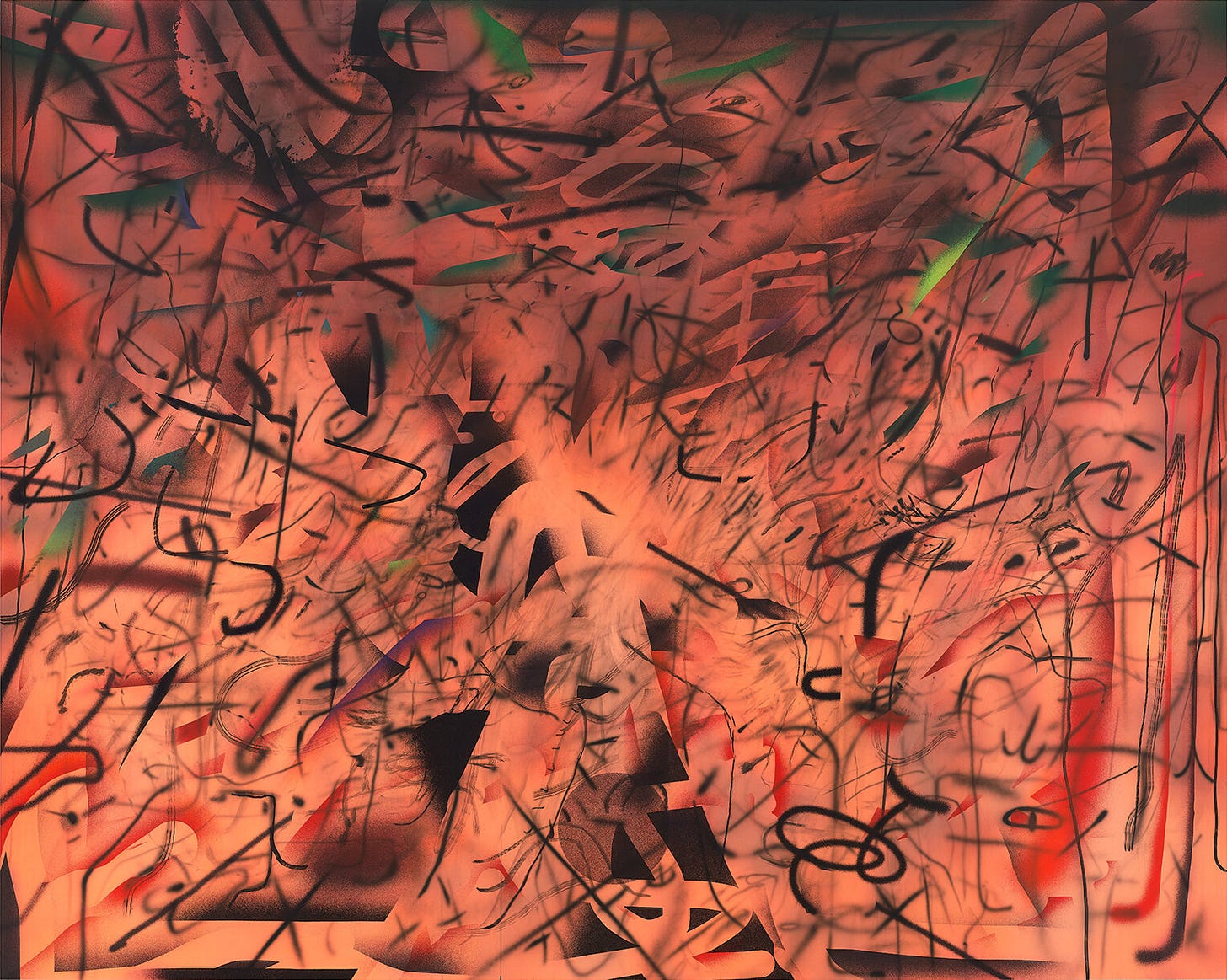Abstract Art: Embrace the Uncertainty
Strange coincidences, Julie Mehretu and our mediated reality

Complicated Abstract Times
This week I’m sharing this 9 minute video featuring the American abstract artist Julie Mehretu. I’m a really big fan of her work, and I’ve featured her in a previous post about how art is always political.
The way she talks about abstract art is really interesting. I think a lot of people find abstraction difficult because it doesn’t have a clear and obvious subject matter, and it’s uncomfortable for some to not know what to think. That feeling of discomfort is definitely something I find when I’m teaching my undergraduate art history students about the emergence of abstract art in the 20th century: most of them struggle with it because they are looking for definite signs they can recognise from their visual lexicon to help them find the meaning.
I tell them to embrace the uncertainty of not knowing, and to think about abstract art as a visual metaphor for what one might call reality. The meaning in Mehretu’s work is difficult to pin down, it’s hazy. But uncertainty is precisely what her work is about. Mehretu argues that it’s really hard to know what our reality is now when so much of how we understand the world is mediated. Through her art she explores that uncomfortable feeling of instability and uncertainty.
You might say her work reflects our lives now: that state of constantly negotiating between realities, different worlds and perspectives. Mehretu adds another layer of meaning because of her experience of life as an immigrant in the USA after her family fled the political turmoil in Ethiopia in 1977. She describes how she operates in a in-between space, on the borders. She reminds me of the artist Maya Lin, whose work I talked about a few weeks ago.
Mehretu speaks eloquently about the global migration of people and the fractious politics of immigration in our current moment. It’s something she has personal experience of, and because her art is a visual metaphor for her reality the politics is embedded in her paintings.
I’d love to know what you think about her work and what she says in this video.
Strange Coincidences
This weird thing happened to me a couple of days ago. I was reading an article online written by John-Paul Flintoff, an artist and writer that I hadn’t heard of before. It was quite a moving piece in which he describes how an art teacher at his school years ago had advised him not to make a career in art, his struggles with his mental health, and his return to art practice later in life.
Five minutes after I finished reading it Flintoff joined my mailing list. That freaked me out a bit, especially in light of my post earlier this week about artificial intelligence, art, and the systems we’re locked in to that operate silently behind the scenes, tracking us without us necessarily knowing.
Off I went down a rabbit hole to find out more about Flintoff. Half an hour later I’d watched him speak at a TEDx conference about how to change the world (he’s fascinating and full of ideas, I’d recommend watching it) and I saw a video of him sketch the actor Olivia Colman live on zoom during lockdown to raise money for a homeless charity. He’s great, and I enjoyed where the rabbit hole took me.
I emailed Flintoff to tell him what had happened and he explained how he found me. I’m now quite sure that it was a really strange and serendipitous coincidence. And I find it comforting to know that old-school chance still genuinely happens in cyberspace.


‘When you spend time with the paintings things begin to emerge’.
But we first have to be able to spend that time and be open to it and that, I think, is already a stumbling block!
We’re in a constant state of daily rush so we don’t have time; we’re intimidated by our world of feelings because we’re so used to lives chocabloc with material practicalities that feelings get ignored; we’re out of practise because we’re used to the meaning of things being presented to us on TV programmes etc. In other words we’ve lost the skill of engaging more deeply.
There are so many issues in the world, huge problems that seem unsurmountable - climate change, immigration and racism...and so many more. But the clue for me in dealing with so many of our problems is reflected in this fact of being uncomfortable with the abstract. Our realities are within us - the issues we face have grown out of our realities. So the problems aren’t really the problems - they’re just symptoms. The real problem is...dare I say it...us!!!
I loved hearing Mehretu talking about her work and shedding light on all that can be found within abstract artwork.
Really enjoyed this video, I hadn't heard of Mehretu before. Thanks! And also, what a nice man Flintoff seems. I watched that TEDx video, and it has inspired me to sow a few extra tomato plants for my neighbours this year!